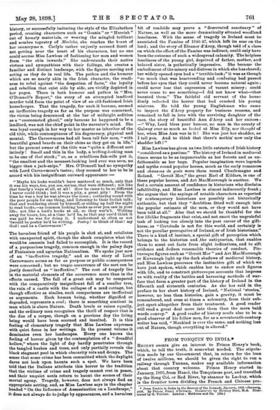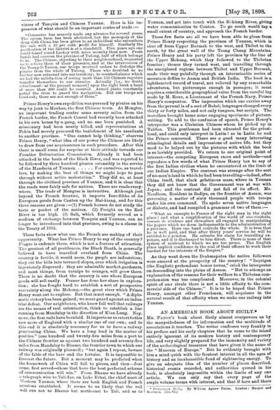FROM TONQUIN TO INDIA,
RECENT events give an interest to Prince Henry's book,_ which, to tell the truth, it somewhat needed. The stipula- tion made by our Government that, in return for the loan of twelve millions, we should be given the right to run a. railway through Yunnan, makes any available information about that country welcome. Prince Henry started in. January, 1895, from Hanoi, the Tonquinese port, and travelled up the Song Coi, or Red River, by steamer to Laokay, which, is the frontier town dividing the French and Chinese pro-- • From Tonkin to India by ths Sources of the Iraloadi, January, 1895—January. 1896. By Prince Henri d'Orleane. Transbvei by Hamley Boot, M.A. ?sated by G. VaiLlier. London : Methuen and Co. 1251.1 vinces of Tonquin and Chinese Yunnan. Here is his im- pression of what should be an important centre of trade :— " Commerce has scarcely made any advance for several years. The opium farm has been abolished, but the monopoly of the drug with China has been given to an individual who encumbers the sale with a 10 per cent, profit for himself. Similarly the pacification of the district is at a standstill. Five years ago one could travel round Laokay with more security than now." fresh bands had overrun the province of Tulong, half of which belongs to us. The Chinese, objecting to their neighbourhood, requested us to relieve them of their presence, and at the intercession of the Tsung-li-Yamen, our troops received orders to dislodge the pirates from the whole of Tulong. Those who troubled us no further now returned into our territory; to counterbalance which we had the satisfaction of seeing more than 150 Chinese regulars transfer themselves to our enemies. Actually [i.e., no doubt netuellement—at the present moment] upon the right bank a band of more than 800 could be counted. Armed junks constantly patrol the river to guard the navigation. But our troops are tired out; there are not enough of them."
Prince Henry's own expedition was pursued by pirates on his way by junk to Manhao, the first Chinese town. At Mongtse, an important trading centre some seventy miles from the French border, the French Consul had recently been attacked in his own house by a gang, and no one been punished. A missionary had been nearly killed, and representations at Pekin had merely procured the banishment of his assailants to another province. "One cannot help thinking," observes Prince Henry, "what idea of our power the Chinese are likely to draw from our acquiescence in such procedure. After this there is small room for surprise at their attitude towards our Frontier Delimitation Commission Already it had been attacked in the basin of the Black River, and was reported to be followed by three hundred pirates ostensibly in the service
of the Mandarin of Yunnan For ourselves, as travel- lers, by making the best of things we might hope to pass through without active molestation." They did so, at least through the civilised province of Yunnan, and it is clear that the roads were fairly safe for natives. There are roads every- where. The trade of Mongtse is instructive. Although just beyond the French frontier, it imports four-fifths of its European goods from Canton up the Hai-kiang, and for this three reasons are given :—(1) French houses do not study the taste or pocket of the natives. (2) Freight on the Red River is too high. (3) Salt., which formerly served as a medium of exchange between Tonquin and Yunnan, can no longer be introduced into that province, owing to a clause in the Treaty of 1885.
These facts show what use the French are making of their opportunity. What has Prince Henry to say of the country ? Plague is endemic there, which is not a feature of attraction. 'The greatest of all pestilences, the Black Death, is generally believed to have travelled overland from China. The country is fertile, it would seem, the people are industrious; they cat the hills into terraced slopes, over which irrigation is ingeniously dispersed ; they are admirable market-gardeners, and most things, from turnips to oranges, will grow there. There is no doubt that the country is one where European goods will sell easily. France has done her share in explora- tion; she has fought hard to establish a sort of prospective suzerainty along the Mekong,—the great river which Prince Henry went out to explore. But that is not enough. "A diplo- matic victory has been gained ; we must guard against an indus- trial defeat. Our neighbours, who know full well that railways are the means of real colonisation, think to establish a line running from Mandalay in the direction of Kian Lung. Nay, more, the first rails have beenlaid. It imports us to retort to this new move of England with a similar one of our own ; and to this end it is absolutely necessary for us to have a railway penetrating China. We have a long lead in the matter of position" (one hundred and twenty-five miles from a port to the Chinese frontier as against two hundred and seventy-five miles from Mandalay to Bhamo, the frontier town to which our railway was originally planned); "but again I repeat, beware of the fable of the hare and the tortoise. It is impossible to forecast the future. But a moment may be predicted when the framework of China will fall to pieces, and then—first come, first served—those that have the best perfected scheme of communication will win." From Bhamo we have already a telegraph wire to Tali-fan, on Lake Erhai, the chief mart of "Western Yunnan, where there are both English and French missions established. It seems to us likely that the rail will run not to Bhamo but north-east to Tali. and so to
Yunnan, and get into touch with the Si-kiang River, giving water communication to Canton. To go south would tap a, small extent of country, and approach the French border.
These few facts are all we have been able to glean from Prince Henry respecting the province of Yunnan, which is shut off from Upper Burmah to the west, and Thibet to the north, by the great wall of the Tsang Chang Mountains. Prince Henry and his party left the province by the line of the Upper Mekong, which they followed to the Thibetan frontier ; thence they turned west, and travelling through the unexplored regions between Thibet and Upper Burmah, made their way painfully through an interminable series of mountain defiles to Assam and British India. The book is a, lighthearted record of travel, not relieved by any remarkable adventures, but picturesque enough in passages; it must acquire a considerable geographical value from the careful log made by M. Roux, a Lieutenant of the French Navy, Prince Henry's companion. The impression which one carries away from the perusal is of a sort of Babel; languages changed every thirty or forty miles, and not only tongues, but scripts. The travellers brought home some engaging specimens of picture- writing. To add to the confusion of speech, Prince Henry's interpreter was a Christian Chinese whom he picked up in Talifou. This gentleman had been educated for the priest- hood, and could only interpret in Latin ! so in Latin he and the Prince conversed. There are a good many interesting ethnological details and impressions of native life, but they need to be helped out by the pictures with which the book is so lavishly provided. We return to our original point of interest—the competing European races and methods—and reproduce a few words of what Prince Henry has to say of the first Indian civilian whom he encountered at the limit of our Indian Empire. The contrast was strange after the sort of no-man's-land in which he had been travelling—indeed, after China itself, that slack gelatinous mass, where in Yunnan they did not know that the Government was at war with Japan ; and the contrast did not fail of its effect. Mr. Needham, Resident in Sadiya, on the frontier of Assam, was governing a matter of sixty thousand people with troops under his own command. He spoke seven native languages or dialects, and had compiled a grammar of two of them :—
" What an example to France of the right man in the right place! and what a simplification of the world of vice-residents, commis de residence and clumeeliers all engaged in manipulating the papers which we deem indispensable to the administration of a province. Here one band controls the whole. It is true that he is well paid, and that after thirty years' service he will be entitled to a pension. He submits his claim for travelling ex- penses, and it is discharged to him direct. There is none of that system of mistrust to which we are too prone. The English place implicit confidence in the zeal of their officers to work their hardest for the interests of the Empire."
As they went down the Brahmaputra the native followers were amazed at the prosperity of the country ! " Inquigen (the English) prehendunt bonas terras," cried the interpreter on descending into the plains of Assam. "But to attempt an explanation of the reasons for their welfare to a Thibetan com-
prehension was too complicated. Moreover, in the colonial spirit of our rivals there is not a little affinity to the com- mercial side of the Chinese." It is to be hoped that Prince Henry, amongst other Frenchmen, will acquiesce in the natural result of that affinity when we make our railway into Yunnan.



































 Previous page
Previous page